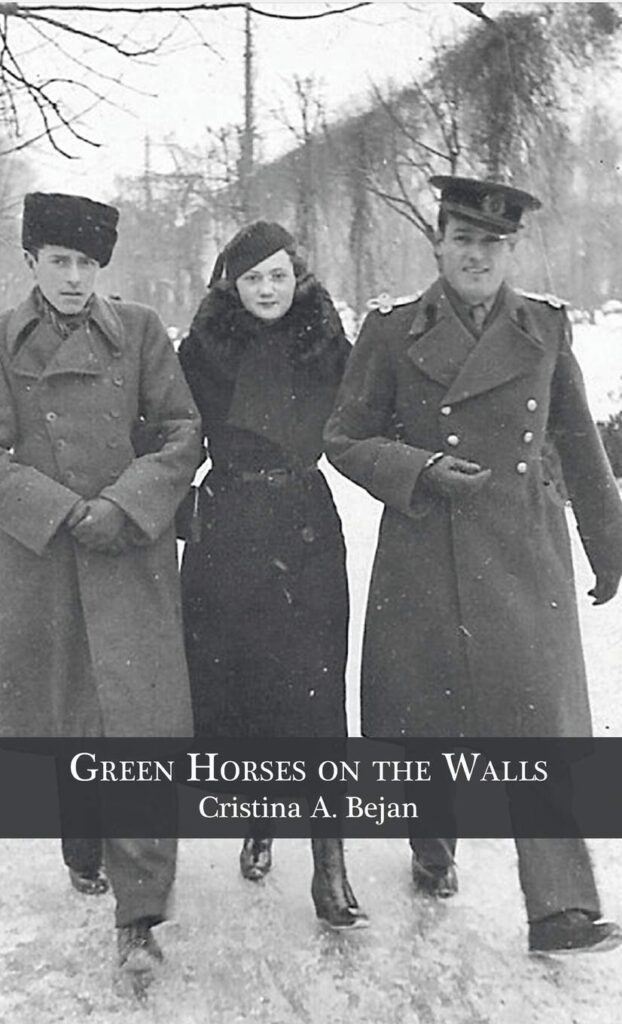by Nicole Yurcaba

In personal poems disclosing intimate confessions, family histories and secrets, and frightening landscapes engraved in one’s memory, Cristina A. Bejan’s Green Horses on the Walls introduces readers to a “tricky diaspora” and to harrowing narratives of self-preservation and survival. Like Alina Stefanescu’s Dor in theme and exploration, Green Horses on the Walls is also a close look at one of America’s most overlooked diasporas—the Romanian Americans. This collection’s emotional pull lies in its daring honesty, specifically the honest observations privy to only any person who has ever lived in between two very different cultures.
“A Tricky Diaspora” captures the sense of invisibility that many members of Central, Eastern, and Southeastern European cultures continue to experience in America. The speaker describes their diaspora as “An assimilate-quick Diaspora.” The first wave of Romanian immigrants to the United States took place between 1895 and 1920. Today, Romanian Americans comprise only one-eighth of one percent of America’s total population. These statistics take on a different context as one continues through Bejan’s poem and encounters lines such as “A country that you’ve never heard of Diaspora.” Other lines allude to painful stereotypes which have haunted Romanians well into the 21st century: “Any race is more beautiful than Caucasian Diaspora / Unless you’re a Roma gypsy Diaspora.” The gypsy population represents only 3% of Romania’s entire population, yet Westerners have the unfortunate habit of stereotyping not only gypsy culture, but many of the unique and intricate cultures and traditions from this crossroads of Europe. As the poem concludes, the speaker and the stereotyping grow more cynical. When an outside speaker poses to the poem’s speaker, “But in the USA we have a future,” the speaker responds, “You don’t have to be from our Diaspora to have heard that one before.” This blunt, succinct line concludes the poem, setting the stage for later poems like “Bucharest.”
Romanians do not appreciate when Westerners declare Budapest, not Bucharest, the capital of Romania. In Green Horses on the Walls, the poem “Bucharest” appears appropriately near the collection’s center. The speaker speaks of the historic city with affection: “It’s the little things / Flower shops on every corner / For hello, for goodbye.” It is a city where both pedestrians walk “With no fear of harassment or someone revealing a firearm,” an observation which subtly jabs at the prevalence of mass shootings occurring in the United States. The poem’s repetition of the contraction “It’s” creates the magnetism which, as the poem continues, lures readers deeper and deeper into not only the poem, but also the city’s life, which makes it “anyone’s—Native, Expat, Diaspora’s—playground.” The city stands in stark contrast to the American South, which appears in the poem “Raleigh.”
Whereas the poem “Bucharest” feels alive because of its vibrant imagery, “Raleigh” embodies the speaker’s soul-searching, as well as the diasporic struggle of being disconnected from the homeland. The speaker describes Raleigh as “Just empty.” Raleigh is a city of “Empty sidewalks / Barren of people.” The speaker notes, “This should be a city throbbing with life,” but instead it is a victim of suburban sprawl, rendering it a “Strip-mall paradise.” The speaker is critical of Raleigh, and this culminates into direct, honest lines such as “I feel isolated.” The speaker asserts, “But I keep reminding myself—this is not Bucharest—this is not DC / Raleigh has its own identity.” The speaker’s lack of explanation about this identity communicates their unhappiness, but the speaker’s determination to “make Raleigh my little Bucharest, my petite DC” inspires readers to embrace the moment, the place, and reshape it into their own individual place of happiness and existence.
Green Horses on the Walls also houses a few surprises for readers—its translations of notable Romanian poets’ works by Bejan herself. These treasures appear at the collection’s end, and they come with a subtle message for readers—to remember their roots. Bejan’s translation of Ana Blandiana’s “Despre tara din care venim” (“About the country from which we come”) is poignant, filled with longing, and universal. It opens directly: “Let’s talk / About the country from which we come.” Its images encourage readers who may be unfamiliar with a culture or place unknown to them to educate themselves rather than rely on stereotypes. The speaker describes their homeland as “a fragile native land / That any falling leaf, / Can extinguish.” For readers familiar with history and geography, these lines stand as a reminder of Romania’s long, complex history despite its small territorial size (Romania is slightly smaller than the state of Oregon in the United States). Solidifying the poem is the incorporation of natural images, which represent what the speaker deems good about their homeland. The grass “Tickles the laughing stars / And there are so many flowers / That your eyes sting.” These lines balance the poems final lines, which are filled with sentiment and longing: “There is so much happiness / That you almost fall asleep.”
Green Horses on the Walls is raw and carefully orchestrated, a symphony of eloquent movements. It is a celebration of place, a revelation that those places which once attempted to snuff out one’s existence can transform, after years of revolution and progress, into places from which one cannot easily separate and live without. It is a passionate collection, bearing beautiful poems whose words are woven delicately and intricately, forming an ia (traditional Romanian blouse) in words.
Nicole Yurcaba (Ukrainian: Нікола Юрцаба–Nikola Yurtsaba) is a Ukrainian (Hutsul/Lemko) American poet and essayist. Her poems and essays have appeared in The Atlanta Review, The Lindenwood Review, Whiskey Island, Raven Chronicles, West Trade Review, Appalachian Heritage, North of Oxford, and many other online and print journals. Nicole teaches poetry workshops for Southern New Hampshire University and is a guest book reviewer for Sage Cigarettes, Tupelo Quarterly, Colorado Review, and The Southern Review of Books.



Add your first comment to this post